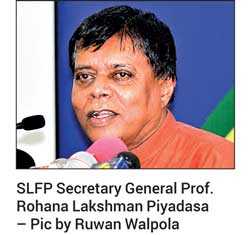Wednesday Feb 18, 2026
Wednesday Feb 18, 2026
Tuesday, 25 December 2018 00:00 - - {{hitsCtrl.values.hits}}
By Uditha Jayasinghe
Readying for a politically decisive year, the Sri Lanka Freedom Party (SLFP) yesterday said it would prepare for a Presidential Election after a Provincial Council poll in 2019, and acknowledged its decision to take disciplinary action against members who joined the United National Party (UNP) but not the Sri Lanka Podujana Peramuna (SLPP) was a “political calculation.”
The SLFP held a meeting of its electoral organisers on Monday morning at President’s House, which was presided over by President Maithripala Sirisena before he flew to Thailand on a private holiday. At the meeting, a range of party plans was discussed, said SLFP Secretary General Prof. Rohana Lakshman Piyadasa, who noted the party was readying for provincial polls and a Presidential Election in the second half of 2019. However, he ruled out any effort to push for early Presidential Elections and insisted the SLFP was simply following the election calendar. He also declined to say whether President Sirisena would be the Presidential candidate.
“The President called the meeting because the SLFP is focused on building a broad alliance composed of political parties, academics, artists, and civil society to prepare for the upcoming elections. The SLFP is a strong party with a long track record of standing for the common man and fighting for his rights. The SLFP was instrumental in introducing free healthcare and education. It was the party that started the Ceylon Transport Board and many other services. However, there is a need to reform these efforts and find a way to make them match current needs. These new policies will form the bedrock of our campaign,” he told reporters at party headquarters.
During the meeting, President Sirisena had said restructuring of the SLFP will begin in January, according to Prof. Piyadasa. The Sectary General also ruled out any more crossovers, and insisted the party was confident it could make a strong showing at the next elections. He noted that even though the SLFP Executive Committee, during an earlier meeting, had taken a policy decision to take disciplinary action against members who crossed over to the UNP, the details of how this may be done is yet to be decided.
“Under the SLFP Constitution, a committee must be appointed to decide what disciplinary action may be taken. But there has been no final decision on this,” he said. When questioned as to why it was crossovers to the UNP may be hauled up before a disciplinary committee, but not crossovers to the SLPP, Prof. Piyadasa said, “We are politicians and as politicians we make political decisions. When we balance out the options, and calculate the best way before us, it is our belief that we can form a coalition and undertake a political journey with the Sri Lanka Podujana Peramuna (SLPP). Therefore we do not see a problem with this decision. Our ideology does not match that of the UNP, but we can work with the SLPP.”
“In politics there can be transactions between friends and foes. We saw that in 2015, but now we see the SLPP as a friendly force. These are just attempts by the UNP to divide us and weaken our vote base. We shall not allow that to happen,” he added.
Prof. Piyadasa also argued an alliance with Opposition Leader Mahinda Rajapaksa, who is believed to have accepted SLPP membership in November, would also promote anti-corruption measures. He pointed out that President Sirisena had already taken steps to expedite action on the Presidential Inquiry report of the Bond Commission, and therefore needed the support of the SLFP and its coalition members to push through stronger regulations and promote accountability.
He also rejected the view the UNP had received a boost from the events that transpired after 26 October, but said any “stimulation the UNP received can be changed in months.”